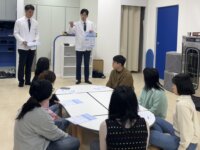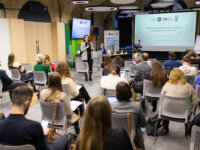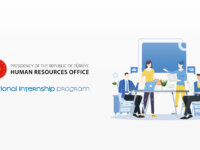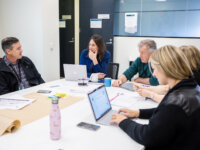Incheon City initiated a demonstration project utilizing AI technology to assist tourists and multicultural citizens in effectively communicating their symptoms to healthcare professionals. Mediark Inc. was chosen for this project through a public tender. The city supports the AI technology's development and demonstration costs, collaborating with Mediark Inc., the Incheon Medical Association, and the Pharmaceutical Association. Mediark Inc. introduced the SIMTOMI app in November 2023.
Innovation Tag: Skills and Competencies
The program offers an online Human Rights course for civil servants with modules from 15 Public Administration entities. It includes initial and final webinars featuring the Ombudsman and three civil society associations, respectively. Graduates propose initiatives to implement Human Rights, fostering a "Network of Ambassadors for the Promotion of Human Rights in Public Administration." A Best Practices Guide will highlight implemented projects.
The UNDP in Ukraine training on a human rights-based approach in public policy design helped public servants who are involved in the digitalisation sphere learn how to develop state policies and electronic services based on principles of human rights and gender mainstreaming. It helped them dispel myths and learn the basic requirements, which resulted in more inclusive public services developed for Ukrainian citizens.
Public services play a crucial role in shaping citizens’ experience of society. This handbook is aimed at professionals working in public services and focuses on concrete pratices to strengthen trust and democracy in everyday service encounters. It helps to make public services more effective by initiating and maintain trust, enhancing participation and agency, and through them delivering better learning, better safety, and better welfare.
The Government of Canada is experimenting writing existing laws and proposed regulations into code. Encoding rules allows us to run legal simulations in the regulatory drafting room, which helps us detect ambiguities, loopholes, and gaps in the rules that often go unnoticed. However, existing tools designed by and for programmers are not intuitive for rule-makers. In response, we set out to develop one – an open-source Rules as Code tool called Blawx.
The National Internship Program, coordinated by the Presidency of the Republic of Türkiye Human Resources Office, is a nationwide program designed to assist youth employability and school-to-work transition. It involves all public institutions and voluntary employers with the aim of providing internship opportunities for university students with principles of equal opportunity and merit ensured by its platform. The Program helped and encouraged candidates to engage in activities for their…
MATEC is the educational project for teacher training and support that promotes an innovative teaching methodology to enhance the learning of mathematics through technology. It was created in response to the declining performance in mathematics, the low inclusion of technology in classroom practices and the need for new tools to personalise student learning and meet the challenge of diversity in the classroom.
In response to the universal issue of a demand-supply gap in the labor market in Bangladesh, the Aspire to Innovate (a2i) Program has launched National Intelligence for Skills, Education, Employment, and Entrepreneurship (NISE). The innovation seeks to utilise data to help those who wish to enter the job market make informed decisions. It is a pioneering approach that ensures collaboration between government ministries and skills service providers under one umbrella to remove unemployment.
Good Coffee is a Vocational Engagement Enterprise that organises a chain of social cafes for people with complex psychosocial disabilities. The cafes provide vocational rehabilitation on a work place and for some, introductory training is already given during their hospitalization in Mental Health Centers. The model enables continuity of care and transition between the realms of Health, Social Services and Employment. Good Coffee also reduces public funding, increases independent living and…
The Small Business Development Corporation (SBDC) has embraced human-centred design to transform the way regulation is developed and applied for small businesses in Western Australia. The SBDC partnered with 22 local governments to deliver the Small Business Friendly Approvals Program, which involved reviewing the approvals journey from the small business’ perspective and designing reforms to streamline processes. The Program has ignited transformational change and made it easier to do…






